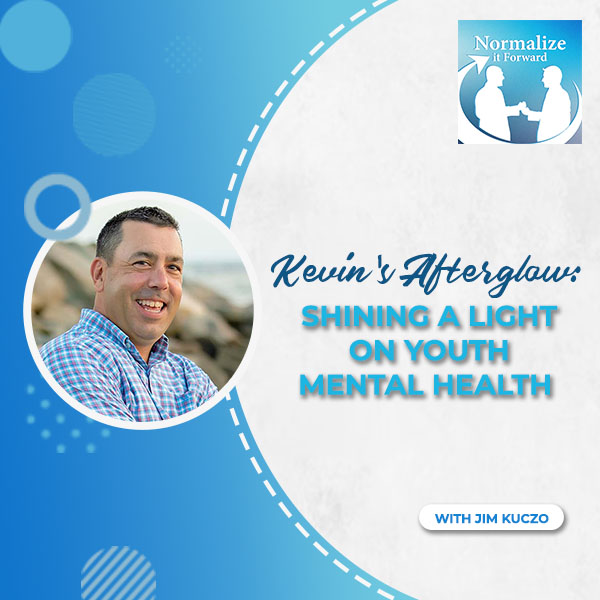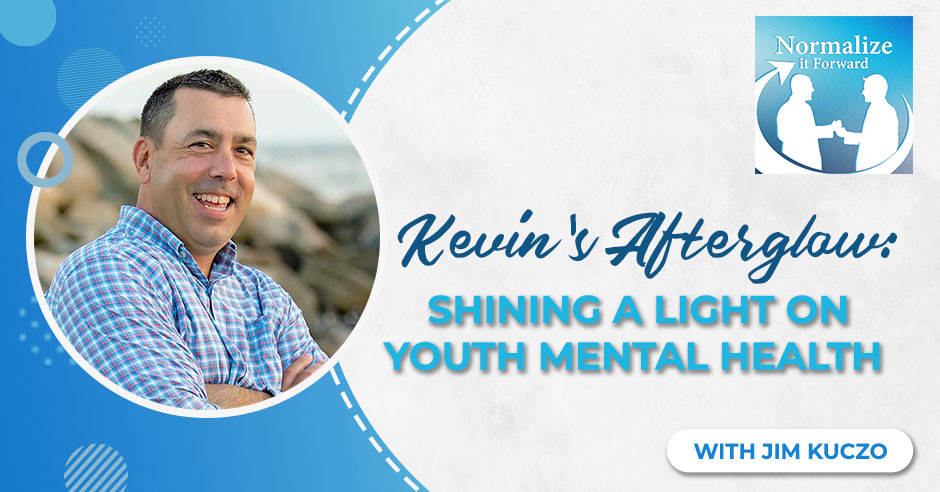
Looking to make a difference in the lives of young people? Join us for a heartwarming conversation with Jim Kuczo, president and co-founder of Kevin’s Afterglow, a non-profit organization born from tragedy and dedicated to fostering hope and resilience. Discover the inspiring story behind Kevin’s Afterglow and how they’re teaching kids the power of kindness, empathy, and mental health awareness. Learn about their innovative Buddy Bench program, a simple yet powerful tool that encourages peer support and helps kids develop crucial social-emotional skills. Plus, hear Jim’s personal journey of navigating grief and loss while making a positive impact on his community. This episode is a testament to the power of human connection and the importance of creating a supportive environment for young people to thrive.
—
Watch the episode here
Listen to the podcast here
Kevin’s Afterglow: Shining A Light On Youth Mental Health With Jim Kuczo
In this episode, we are welcoming in Jim Kuczo, the President and Cofounder of Kevin’s Afterglow. Jim and his wife, Kristen founded Kevin’s Afterglow after their son, Kevin, took his life on February 4th, 2021. The mission of Kevin’s Afterglow is to teach kids, kindness, empathy, and the ability to listen to each other and give to others, educate parents and children on mental health, help address the pediatric mental health crisis, and plain get people talking. Thank you so much. Jim, welcome. How are you?
It’s good to see you again. I’m doing well.
It’s good to see you as well. Thank you for being here. I so appreciate you taking the time. Maybe one way to kick things off would be for you to tell us the story behind Kevin’s Afterglow.
Kevin’s Afterglow: A Story Of Hope And Healing
My wife and I founded Kevin’s Afterglow about a year after our son, Kevin, took his life. We lived in Fairfield. He went to Fairfield Warde High School and died on February 4th, 2021. My son went away on this trip. It was called the Appalachia Service Project. He did that when he was a junior and they went down to Appalachia, West Virginia. It’s one of the, I’d say, poorest places in America.
They go down to make houses warmer, safer, and drier. He came back on that trip. He did good and met a lot of people. He said, “Dad, I don’t know what I want to do with my life.” He was a freshman or sophomore. He said, “I want to help people.” We’re trying to honor that desire to help people by understanding mental health.
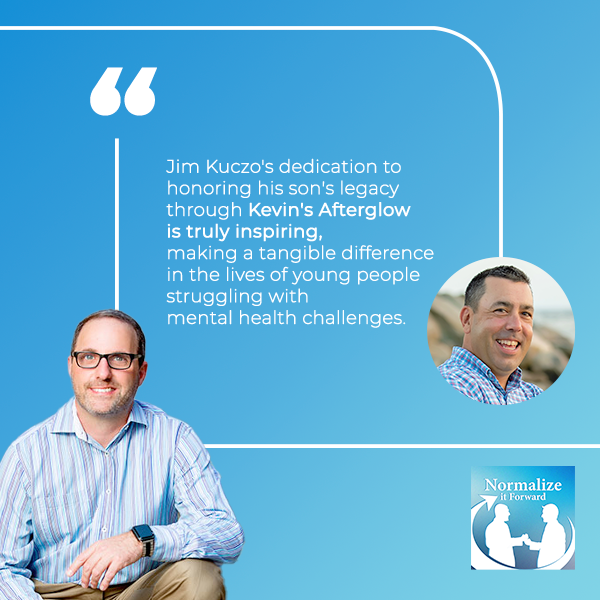
I didn’t understand mental health. Even when we knew Kevin had depression, for people of my generation and my parent’s generation, it was something you didn’t talk about. You kept hush-hush. Kevin’s Afterglow is here to try and teach kids at a very young level empathy and look out for each other. We want to help people and educate parents and children on it.
The stuff that I didn’t know, I’m a quasi-expert on this now. I wish I had known. I know it’s not the subject that everyone wants to talk about but it’s here. It’s real, treatable, and beatable. There are doctors for this. If you have a problem with your heart, you go see a cardiologist. If you have a problem with your eyes, go see an optometrist. There are psychiatrists, psychologists, and people who are trained to help you with this.
It’s a brain problem. It’s not a “you problem.” It’s an imbalance. It can be treated and it’s beatable. It’s like any other disease. That’s the message that we’re trying to get out here. We’re trying to get out that there are many resources out there on the internet and so forth, whether it be the North American Mental Alliance or NAMI. Even in our government, the CDC and NIH have great websites out there. Those are all for you to see on KevinsAfterglow.org.
It’s a great website. I’ve been on it several times. Jim, I so appreciate and admire what you do. I’ve had the opportunity to present with you and talk with you in the past. You are an incredible individual. You’re warm, caring, and considerate. Most importantly, though, you’re a human being and you realize that we’re all built the same. We’re all susceptible. When a parent thinks their kid isn’t, guess what? They are.
I can tell you that I’m not a perfect person, father, husband, son, or brother but I thought I was doing things right. I check in the boxes. I got a house and a mortgage. I’m working, stable, and everything. I never thought it was going to happen to my family. I’m not perfect but if it can happen to my family, it could happen to your family.
Suicide is not a word people like to use or a topic that people like to talk about. Neither is depression. There are presentations I do where I avoid using the word because it’s such a turnoff to people but yet it’s one of those things. The suicide rate is as high as it’s ever been in young adults. The depressive rates and the anxiety rates for high school and college-age kids are higher than they’ve been in years. You and I talked about this a bit but the thrust behind what we’re doing is, “Let’s talk about it.” If we can offer tips and suggestions, make mistakes, and other people can learn from them, fantastic. That’s what life is about.
Social Media’s Impact On Mental Health
I heard a psychiatrist on the news call it a modern-day weapon of mass destruction and how social media could be cruel. Even if people aren’t trying to be cruel, people can perceive it like, “Mark was in Turks and Caicos. They were in Florida two months ago. How come they get to go on all these vacations? Look how big their house is. Look at that car. How come they’re at that party and I wasn’t invited?” It’s things like that. It’s simple things where you get left off of texturing and you’re gone for a while. You add the normal things of trying to get pressures of getting into college if that’s what you want to do or sports specialization and other things. It’s very tough for these kids. Everything’s magnified because of social media.
It's very tough for these kids, and everything's magnified because of social media. Share on XYou and I both know this as adults. The sad part is that social media is one-dimensional. It doesn’t tell a story at all. I’ve had people in my office crying in the afternoon and posting in the evening.
COVID’s Lingering Effects On Children’s Mental Health
It’s a rush. I know it’s past but I always say that my son didn’t die of COVID but he died of COVID. We’re talking about connecting with people. We took away all the connection and almost every student went through that in some form or another. It’s gone but it got a lasting effect on kids.
You look at even 2023, for example. There was a variety of students who missed graduation because of the encampments on campus. It occurred to me that that’s the same class that missed graduation because of COVID in high school. It’s how that affects kids.
Kevin had depression before COVID but it bumped it up at another level. Right after Kevin died, I read something from the Pediatric Mental Health Alliance. It’s something very official. Self-harm in the Northeast around 2020 to 2021 rose to 333%. I say to kids, “Where are you?” “We’re in the Northeast.” It’s crazy. This was my son’s 2020. The school goes remote. At first, kids are like, “Yeah, no school,” but you have to sit in your bedroom, look at a screen all day, and try to pay attention.
I still have an undiagnosed ADD problem. I have three screens and I don’t know what to do with them. The cross gets canceled and any type of dances or proms and that trip I talked about. The service project to Appalachia was canceled. This beautiful sunset in Eastern Maine and the Canadian border, where my family goes, we couldn’t go because it is in Canada. They weren’t letting people in.
That’s where some of Kevin’s ashes are spread up there. That’s why I have it. Cancel. Everyone’s going to die. What do you have to look forward to? I get it. There are words that people hear. I try to not be on Facebook so much but something came up on my feed and she was called The Good News Girl. Those were positive stories. I subscribe to it because there’s too much negative stuff out there.
Hope And Healing: Empowering Kids Through Education
It’s good to hear that stuff. You tap into an important word that I want to ask you about, which is hope. COVID took away hope for a lot of people. One thing that I find is that kids who are applying for college get turned down for the prom. They don’t get into a particular job that they want to get into. They feel like they have no hope. You and I both know as grown adults that this too shall pass but a lot of those kids can’t see over the horizon.
Their brains aren’t fully developed yet. I was laid off in May 2020 so I’m still looking for a job. It is tough being mid-50s looking for a job but I know it’s going to come. Kids don’t see that. I use the power of social media. When I was in sixth grade or seventh grade, I got my first girlfriend. I’m not going to say her name. We held hands down the hall during the third period. In the fifth period, I got a note from her friend saying that we were broken up.
If that was now, she could have broken up with me on Snapchat, Facebook, and in front of the whole world. I would feel like the biggest moron ever. How do you recover from something like that? It’s a holy world for these kids. That’s the feedback I have been given when I’ve given my presentation and I talk about all these things. I’ve heard, “That is the way I feel.” It was coming from kids crying and shaking in my arms. They’re like, “I can’t believe someone else feels like the way I do.” We tell kids that there is hope of seeing a doctor and also medicine. There are many things that can help you out there.
You hit on something important that I want to emphasize. Part of the way we need to learn out a parent is we have to listen more. We’re not going to, as a parent, jump in and fix these things. It’s not a project to fix. It’s our job to listen and find support out in the community, whether it be an ally in school or a therapist, pediatrician, psychiatrist, or whomever, even a group, for kids to begin to feel good about themselves and look at the opposite of depression and anxiety, a world of peace and calm. I’ve had kids join gym groups, meditation groups, baseball groups, you name it. It gives them that sense of like, “I am good at something.”
Belonging to something. Kevin was on the Warde football and lacrosse teams. He wasn’t the star. He was pretty good. He was a great teammate. He’d rather not go in and see someone else do better and cheer them on or see someone who hasn’t done well do well. That’s the kind of kid he was. He loved the team. I have examples of headlines from a young boy in Maine and another boy in Chicago. It’s unbelievable. Both are football players. They could have taken their names out and put in Kevin’s. Once football got canceled, he felt removed from his friends and disconnected from this, that, and the other things. They took their lives as well.
The Buddy Bench Program: Fostering Connection And Support
Jim, forgive me. I can’t remember the exact language but there was a period when you were promoting and establishing benches outside of school. Tell my audience about that.
Kevin’s Afterglow is a 501(c) nonprofit charity approved by the government and everything. We do two things with the money that we fundraise and donations. It goes to our Buddy Bench program and Pediatric Mental Health Scholarship Program. My wife is a second-grade teacher in Darien. Her teaching colleagues donated a buddy bench to Jennings Elementary, where my two boys went.
I had never heard of it. We went to a dedication. I was like, “This is neat.” There are rules around the bench. If you’re feeling sad, lonely, or not included on the playground, you can go sit on the bench. Kids are taught, if I was on the bench, to go over and help them. “Do you want to come play with me?” If you’re sitting on the bench, you have to go play with that person if someone asks you to.
I thought this was neat because I was trying to figure out some way. I know kids were affected by the COVID thing at a very high level. I’ll go more into that. I didn’t ask for help from anyone until Kevin died. I needed help then. It’s a hard thing for an adult to ask for help, let alone a kid. If we can teach a kid at a very high level to ask for help and then receive help, that’s pretty cool. “What if I do reach out to a doctor or somebody who can help me like a counselor?”
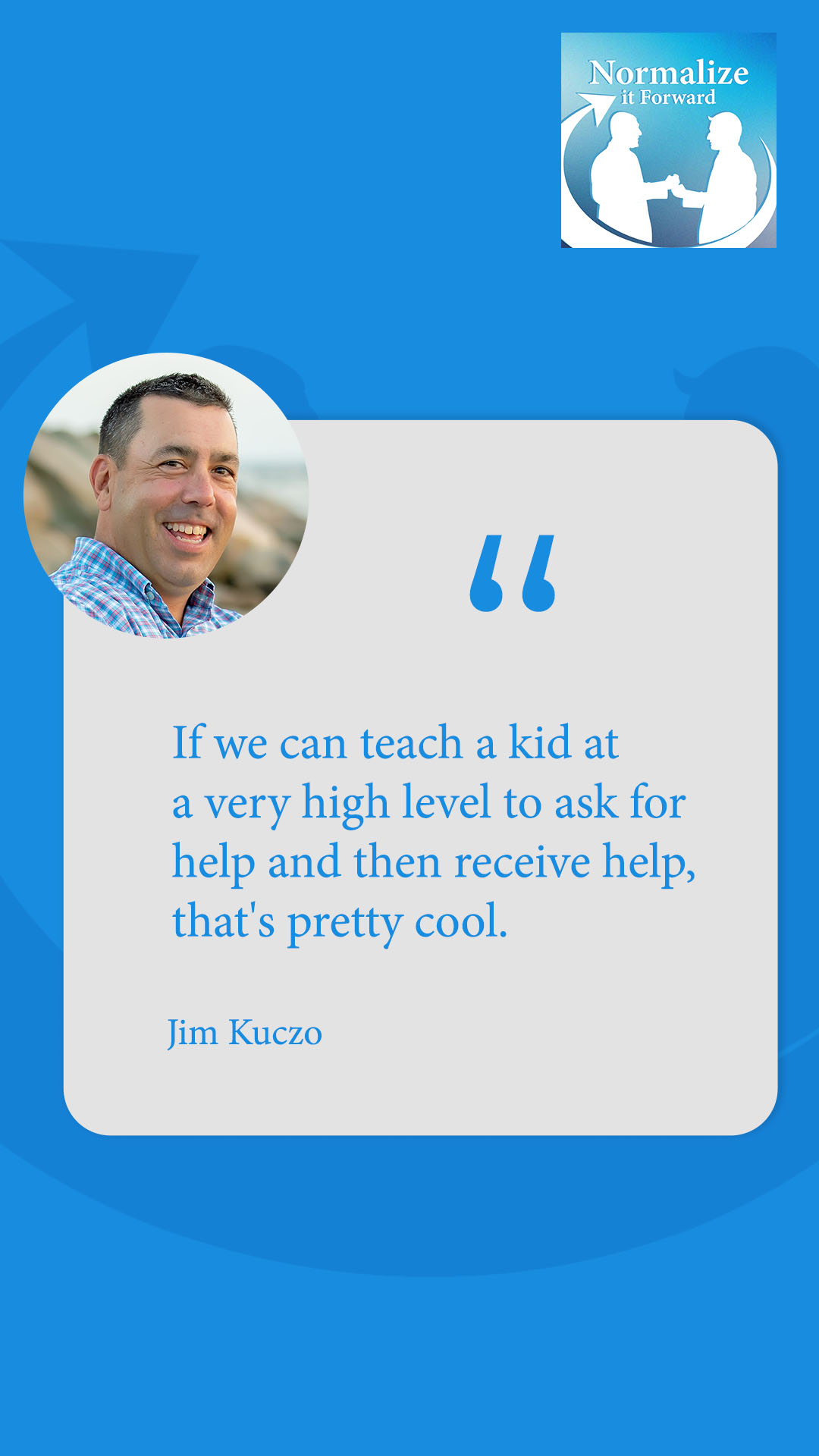
This teaches them at that young age. If we can get a hold of the depression, anxiety, and feelings, and they are overcoming us and we’re feeling sad, we can go talk to somebody. There is hope. We’ve been placing Kevin’s Afterglow Buddy Benches. There are nineteen public schools in Fairfield. By the end of November 2024, we’re going to have them in two more elementary schools. We have them in the middle schools and high schools, too.
At first, I was going to do the elementary schools. When we go in, we give them instructions, curriculum, and books. We don’t plot down a bench and say, “Here, figure it out.” These kids are being taught. What a nice reminder when they go to middle school and high school. You don’t have to necessarily sit on it like you would in elementary school but it’s a reminder to check in on people and look out for others.
No doubt. I love it.
What’s cool is we also have local businesses. We do fundraise events with them. It’s a connection through town. They see the kids here and there at school. At Osborn Hill Elementary School, my wife and I usually do a dedication. We talk about what the bench is for and then tell a story about Kevin. We tell them that he passed away but he was a kid who looked out for his friends. “Let’s do that.”
This sums it up perfectly. A mother wrote on Facebook, “I’m not a big post person but sharing as I want if I knew and love Kevin. My daughter, who was a first grader at Osborn Hill, came home talking excitedly about Kevin’s Afterglow Buddy Benches around town. No one will ever be without a friend. I asked her if she knew what they were named after and she said Kevin was a boy who was kind and friendly to all always.”
She said whenever anyone was upset or alone, he would invite them to play and cheer them up. She knows he died and that he left behind friends and family who shared wonderful things about him and loved him very much. That is his afterglow. She knows the benches are a way of spreading that love in Afterglow. If I were Kevin’s mom, I’d want to know that some little girl somewhere inspired by this was talking about this wonderful life to her mom in their kitchen over dinner.” That’s exactly what I want to do. It makes me cry every time I read it. It’s amazing.
Thank you for sharing that. That was awesome.
Investing In The Future: The Pediatric Mental Health Care Provider Scholarship
The other thing that we’re doing and what I want to impress upon people that we found is that we have a pediatric mental health care provider scholarship. We were going through trying to find a counselor so I got a counselor to talk to Kevin and tried to get a psychiatrist to dispense medicine. The rates are skyrocketing. There are a lot of people looking for these doctors and there’s not enough out there. It’s very hard.
I would encourage any parent who’s going through this to go on sites like Miami AFSP. You’ll see the ten different times types of mental health conditions that your child might be exhibiting. There are not enough doctors out there. What we want to do with those people who are studying to be licensed social workers, counselors, or psychiatrists is give them money and help them. We’ve given out about $20,000 worth of scholarships over the past few years.
Congratulations. That’s awesome. I have to say congratulations on the benches too. What an amazing project. Thank you for reading that email. That’s what brings it home. When a person says that, that’s truly amazing. You work so hard to promote wellness and kindness. You may not always hear those emails.
Everyone has their phones but I had this camera where I would take sports pictures of my kids. I just press the button and it would take about 100 pictures. I know 1 or 2 of them will come out good. That’s what I get when I’m talking to an audience. “I know I’m going to get through 1 or 2 kids.” The stuff that we’ve done, I know for a fact that we’ve helped save two lives in Fairfield through talking. We teach people to act, acknowledge, care, and then tell a trusted individual.
There was one girl who had taken some pills and vodka and told her friends. They knew what to do. They saved that girl’s life. There was another boy who was acting strange and was complaining about things. They were trying to text him but he wouldn’t text back. They told his brother to go into his room and his brother saved his life because he was in the process of hanging himself. It’s crazy.
Don’t Ignore The Signs
Thank you so much for sharing those stories. These are hard stories to share. If I could ask my audience to go to KevinsAfterglow.org. Please go over to that website. It’s chock full of good information. Most importantly, what I want my audience to take away from our conversation, both parents and kids, is don’t ignore the signs.
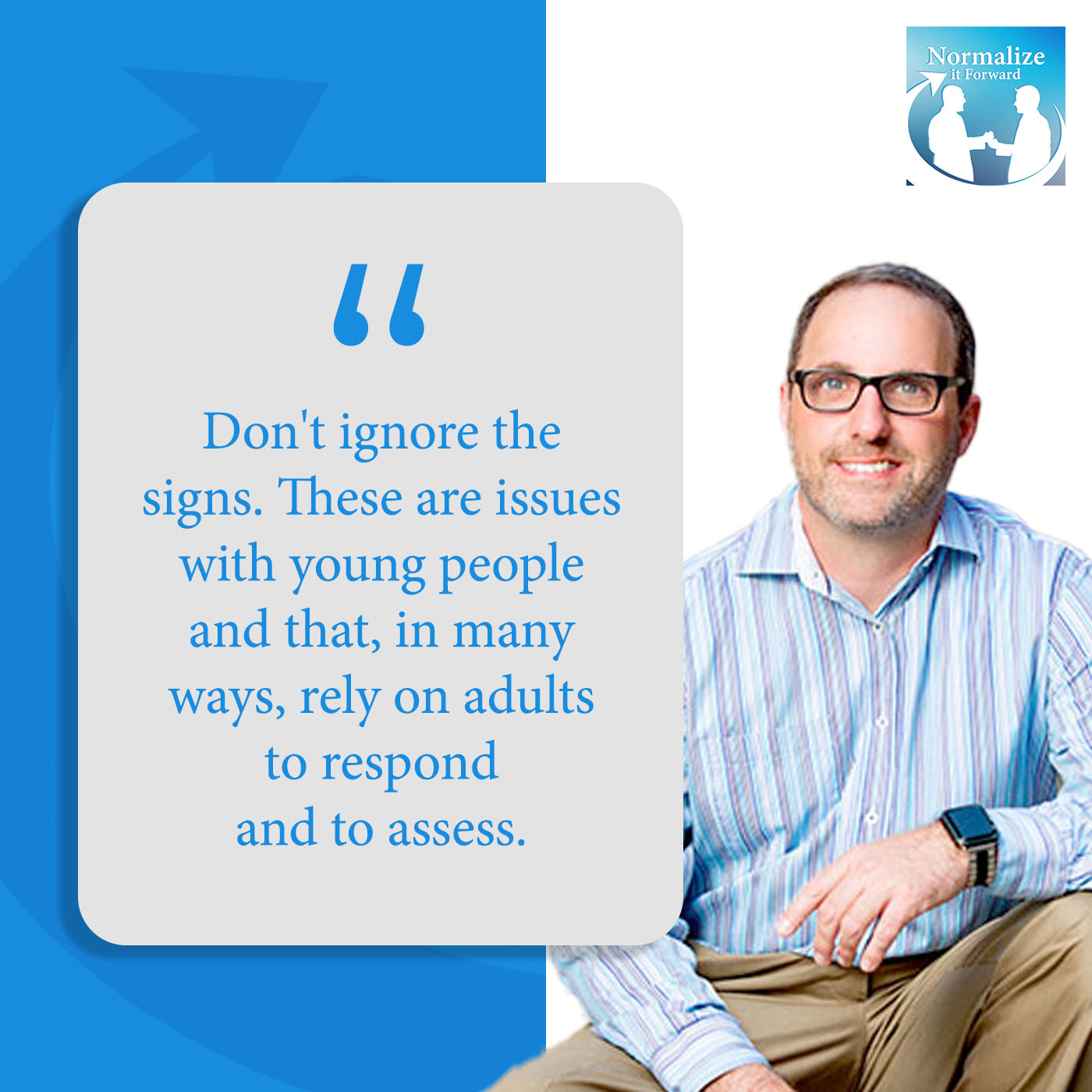
If there are things going on and there is a general sadness with a young person, whether you’re their friend or parent, or you simply know the kid, do not ignore that because that could very well be the sign and symptom of that person getting ready to do something tragic. A lot of times, as you know, these signs and symptoms can be subtle. Sometimes they’re overt but regardless of how they present, we know that these are issues with young people, and in many ways, they rely on adults to respond and assist.
People from our generation think that it’s the kid out in the corner, maybe dressed weirdly, or something like that by himself. My kid has something we call high functioning or smiling depression where we were concerned and we saw stuff at home but he did not act that way at school. We asked the guidance counselors and teachers and they’re like, “No, he’s smiling. He’s high-fiving people. He’s part of the mix, if not stirring the mix.” There was something about him that he felt he didn’t fit in. The brain is very powerful in making what seems different.
The brain is very powerful in making what's real seem different. Share on XThe after-effects are immense for everybody who knows people like Kevin. One thing I’ve recognized and I feel is starting to change in the last couple of years is people are asking more questions. People see someone sad. They’re less unwilling to keep walking. They ask the question. To me, that gives me hope that those individuals aren’t necessarily being ignored and overlooked. That comes from these kinds of discussions, Jim. I applaud you for your efforts. It’s immense. There are many people that you are helping that you don’t even realize you’re helping. Thank you for all of your efforts and all of what you do.
Thank you.
You’re welcome. The concept behind this show is I want not only for us to have an open conversation but I want it to keep going. What I normally ask is when I interview someone, if maybe you have someone in your world, a friend, a coworker, a relative, or someone who you think would be good for me to interview next to keep the conversation going. Any thoughts? Anyone you have in mind?
Unfortunately, I know other people whose parents of their sons took their lives. There’s a gentleman who has a foundation called Believe Your GRReatness. His son died who was very much into music so they have a music-type scholarship and music therapy. There’s The HT40 Foundation. Hayden Thorsen was a young man in Darien, Connecticut. He was a hockey goalie. He took his life about a year after Kevin did. They have something pretty cool. It’s called the Shoulder Check Initiative. You normally shoulder checks no one in hockey but this is more like, “I’m here for you.” I can certainly give you some names. I know a bunch of wonderful people who have some great foundations.
I appreciate it. My interest is I want to keep the conversation moving and give everybody an opportunity to talk. Everybody has a different perspective. We continue to grow and we share those perspectives. To me, it’s having an open conversation and dialogue, showing up, and being supportive of people. Thank you so much for your time. I know you’re busy. I appreciate you taking the time.
Anytime.
We’ll talk soon. Have a wonderful day.
Let’s get a bench up in Avon.
I would love that. I will propose the idea. I didn’t even tell you but I’ve been at a prep school in Avon in 2024. I’m consulting. It’s time for me to bring the concept up to them and we’ll talk to them.
The biggest ones were all 900 students at Fairfield Prep. That went well. I could put you in touch with the main counselor there, Robin Bellotto. Sometimes, you have to have those serious conversations.
Let’s make it happen. I appreciate the offer, Jim. We’ll talk. Thanks for coming. Take care. Bye bye.
Important Links
About Jim Kuczo
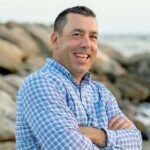 Jim Kuczo is the President and Co-Founder of Kevin’s Afterglow.
Jim Kuczo is the President and Co-Founder of Kevin’s Afterglow.
Jim and his wife Kristen founded Kevin’s Afterglow after their son Kevin, took his life on February 4th, 2021.
The Mission of Kevin’s Afterglow is to:
-Teach kids kindness, empathy, and the ability to listen to others…give to others
-Educate Parents and Children on Mental Health
-Help Address the Pediatric Mental Health Crisis
-Get people to TALK

